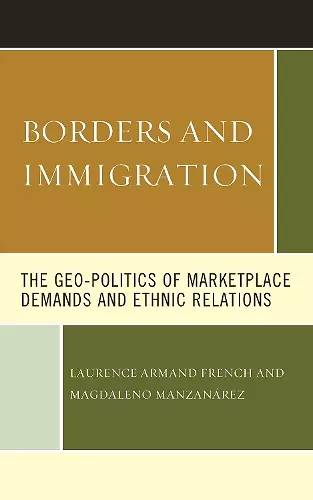Borders and Immigration
The Geo-Politics of Marketplace Demands and Ethnic Relations
Laurence Armand French author Magdaleno Manzanarez author
Format:Paperback
Publisher:Lexington Books
Published:4th Mar '22
Currently unavailable, and unfortunately no date known when it will be back
This paperback is available in another edition too:
- Hardback£85.00(9781498584043)

Borders and immigration are topics dominating world affairs during the 21st century including North America. This book examines the historical antecedents to the current crisis notably along the U.S.A./Mexico border under the Trump administration. Both the immigration and border issues transcend the current Administration with a history as long as that of America itself. Market demands often determined the influx of immigrants into the United States resulting in periods of anti-immigrant backlash based on race and ethnic factors. The geo-politics of market factors and immigrant backlash is rooted in both de jure and de facto politics. These factors are examined in detail with particular attention to the treatment of indigenous peoples of the Americas.
French (a licensed clinical psychologist) and Manzanárez (emer., political science, Western New Mexico Univ.) provide a timely examination of the relationship between immigration, capitalism, and racism in the US, and how this relationship shapes the current immigration debate, particularly the crisis along the US-Mexico border. The authors lay out their argument in the first chapter, and in subsequent chapters they provide a detailed history of how economic conditions in the US—beginning with aboriginal trade routes, colonial capitalism, and Manifest Destiny—tripled the size of the US because the country required a new labor source, particularly with the end of slavery, to take advantage of its vast natural resources. The authors contend that market conditions in the US create a cycle where migrants are needed to ensure economic growth, but the presence of migrants leads to racist actions and policies against them. The authors note that although the Trump administration’s policies concerning immigrants seem extreme, in fact much US immigration policy has had a racist foundation. The authors emphasize how the power of collective attribution bias exacerbates the problem: immigrants are treated as outsiders, which allows such policies to persist. Summing Up: Recommended. Upper-division undergraduates through faculty.
* Choice *A must-read book and one that readers will enjoy reading and find very informative. The book is timely based on recent issues involving current conflicts. It discusses how racism indirectly affected the growth of capitalism in North America. It discusses how white supremacy influenced relations between United States, Mexico, Canada, and indigenous people within the three countries from pre-colonial America to present day. It discusses the treatment of Asian immigrants. I especially enjoyed the discussion of the geo-political impact of the border conflicts and the war of drugs and minorities. The book establishes that immigration is a crucial component of the global economy. -- Cliff Roberson, professor emeritus, Washburn University
This is a thoughtful scholarly book that is high relevant, not only because of its interpretation of group dynamics and important aspects of American economic history, but its application to today’s America. -- Jeffrey Ian Ross, University of Balti
ISBN: 9781498584067
Dimensions: 220mm x 154mm x 15mm
Weight: 313g
208 pages